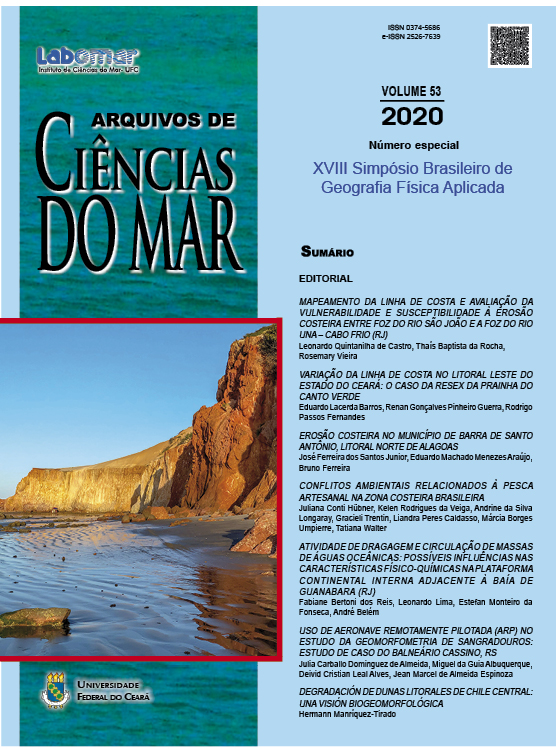Offshore wind farms in Brazil and the potential social impacts: application of SWOT Analysis
DOI:
https://doi.org/10.32360/acmar.v53iEspecial.42667Abstract
With the steady increase in investments in the electricity sector, international initiatives have emerged for the introduction of wind turbines in offshore environments. In Brazil, three distinct initiatives have been articulated for the construction of marine wind farms. It is estimated that different social impacts will arise involving coastal populations making use of nearby ocean and maritime resources. The objective of the research was to analyze, in a participatory manner, the introduction of an offshore wind farm project in coastal waters of the west coast of Ceará, Brazil. It was used the elaboration of SWOT Analysis with the fishermen of the communities near the project, as a tool for the local participative diagnosis. 36 Strengths, 27 Weaknesses, 20 Opportunities and 13 Threats were indicated. It was possible to understand that ensuring social inclusion promotes considerable gains. Effective public engagement should follow methods that
allow the relevant information to be transparent to residents, promoting fluid and didactic discussions and decision-making in a participatory manner, ensuring dialogue between entrepreneurs, the state and affected communities.
Keywords: offshore wind farm, SWOT Analysis, social impact assessment, public participation.
Downloads
Downloads
Published
How to Cite
Issue
Section
License
1. Proposta de Política para Periódicos de Acesso Livre
Autores que publicam nesta revista concordam com os seguintes termos:
- Autores mantém os direitos autorais e concedem à revista o direito de primeira publicação, com o trabalho simultaneamente licenciado sob a Licença Creative Commons Attribution que permite o compartilhamento do trabalho com reconhecimento da autoria e publicação inicial nesta revista.
- Autores têm autorização para assumir contratos adicionais separadamente, para distribuição não-exclusiva da versão do trabalho publicada nesta revista (ex.: publicar em repositório institucional ou como capítulo de livro), com reconhecimento de autoria e publicação inicial nesta revista.
- Autores têm permissão e são estimulados a publicar e distribuir seu trabalho online (ex.: em repositórios institucionais ou na sua página pessoal) a qualquer ponto antes ou durante o processo editorial, já que isso pode gerar alterações produtivas, bem como aumentar o impacto e a citação do trabalho publicado (Veja O Efeito do Acesso Livre).

